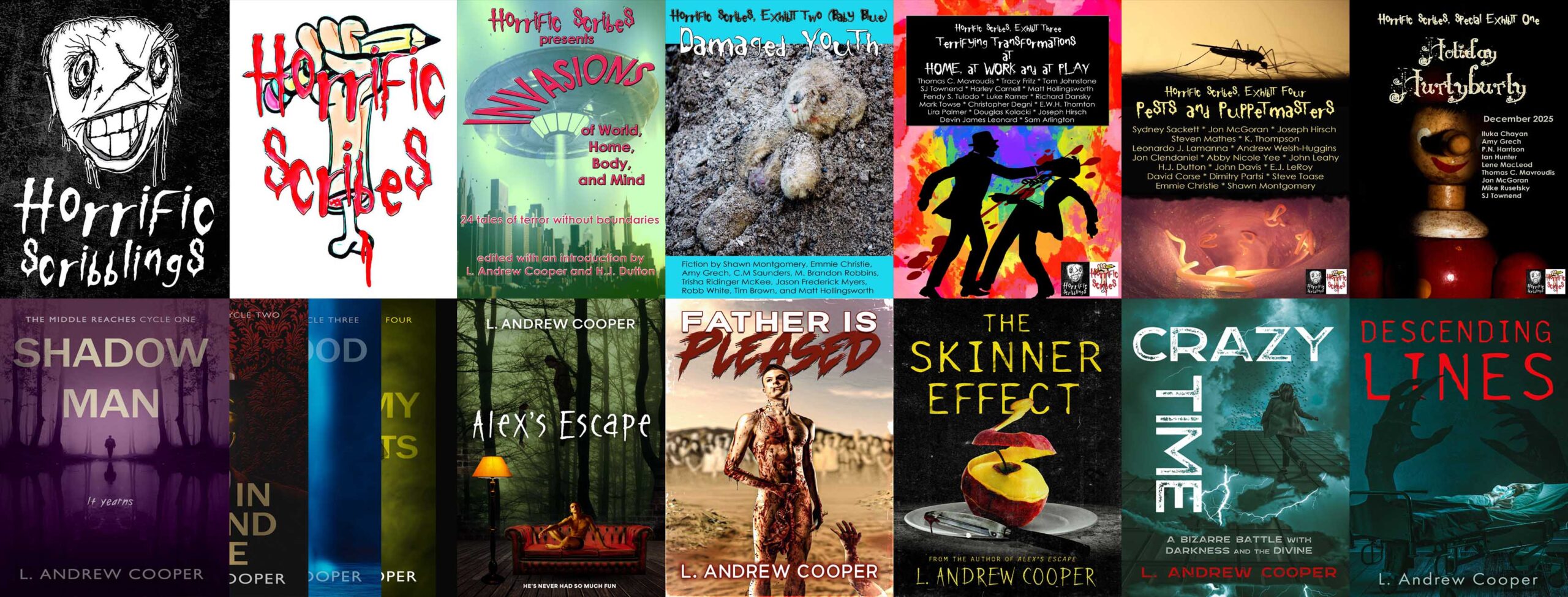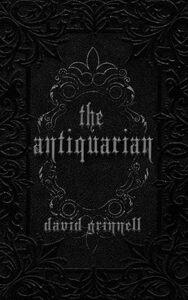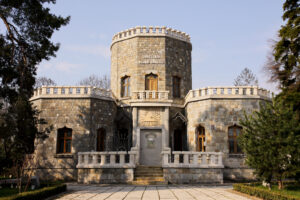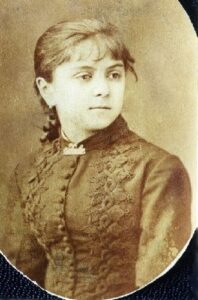Interview with Author David E. Grinnell: The Antiquarian (2024)
Sharing a fascination with dark subjects similar to that of his novel’s hero, David E. Grinnell discusses the moods, influences, and ideas that shape The Antiquarian.
The Antiquarian
The pages of this diary belonged to a young British archeologist, Nicholas Ainsworth, known for his odd curiosity for the morbid and macabre. HIs expedition for deviant burials and historical artifacts in the Transylvanian Alps abruptly ruined by the approaching Nazi occupation, he seeks refuge in a mysterious old castle. As he settles into the abandoned gothic ruins, strange phenomena cause him to question his sanity… and whether he is truly alone.
The Interview
1. Epistolary Perspective. The so-called “Neo-Gothic” literary revival of the late nineteenth century, which included Bram Stoker’s Dracula (1897), one of The Antiquarian’s touchstones, often favored epistolary forms, so your novel’s diary form recalls some of those classics. Why did you choose the form of a diary for your story set in the 1930s and 40s? The diary not only locks the reader in Nicholas’s perspective but in the limited details he chooses to share. What advantages and disadvantages does this limitation create? Your book begins when Nicholas is quite young. What might a more mature reader be able to see in Nicholas’s writing that Nicholas himself hasn’t yet understood? How does the epistolary form, which increasingly emphasizes Nicholas’s state of mind while writing, contribute more generally to the development of character psychology and narrative suspense? Nicholas reflects on grief and considers his writing therapeutic. To what extent is this novel about an approach to processing grief?
DEG. I felt the form of a diary would establish a stronger connection with readers because a diary is very deep and personal. As a reader, you’re reading the most inner thoughts of an individual and inside their mind. The epistolary structure also, I felt, enhances the experience of the unreliable narrator because of how limited readers are in Nicholas’s perspective. These I believe are positives; however, there are negatives to how Nicholas’s perspective is limited. For instance, for the writer, epistolary stories can be difficult because of finding a balance between giving the reader enough information to participate in the story, but not so much information that the voice becomes inauthentic. Writing this novel took eight years, and throughout those years, I really had to develop Nicholas. There were several drafts where I pondered Nicholas’s voice. How would he talk? How would he speak? How would he write? I really had to polish him throughout the years through his diction. Yet, for me to do this, I’ve had to have more experiences in my life. As I grew, my writing grew through my experiences of grief, loss, love, and such.
2. Dangerous Books and Ideas. While he fears losing his mind, Nicholas seems particularly afraid of what he reads in certain books that discuss the supernatural and the occult, particularly topics such as spiritualism and spirit photography, both of which were popular in the late nineteenth and early twentieth centuries. Why do such topics, which he at least consciously considers to be nonsense, disturb him so much? In your Preface you discuss how M. R. James’s antiquarian ghost stories influenced your story, including their frequent inclusion of a book that “at least attracts the unwelcome attention of a supernatural menace.” In your book’s world, why does a book have this kind of power? Should Nicholas approach reading with more trepidation? Should we all?
DEG. For the scholars, professors, archeologists, clerics, and antiquarians, the archive gives them a feeling of both skepticism and intellectual superiority. The supposed cleverness of characters like Nicholas lets them solve puzzles and uncover clues where others have failed. However, their over-confidence in rationalism is always their undoing. Digging into the past usually awakens a deadly supernatural force of some kind. Away from their archives and out in the real world, these solitary scholars soon find themselves in over their heads. Archaeological excavation in these tales is usually a violation of some kind, a sacrilegious curiosity that demands punishment. Such fiction shows us that the search for knowledge of the past may unleash horror.
3. Scared of Architecture. Gothic fiction, the forebear of modern horror, got its name from Gothic architecture and the renewed interest in it taken by the British upper class starting in the mid-eighteenth century (Horace Walpole, author of the first Gothic novel, 1764, built a castle “folly” like the Hasdeu Castle “folly” that appears in The Antiquarian, though Hasdeu was built 1893 – 1896). Your novel uses several Gothic settings: why do you think old stones, pointed arches, crenellated towers, and flying buttresses still fire the dark side of the imagination? What’s scary about Gothic architecture? Can Gothic ruins resist having symbolic implications? What might the ruins you depict symbolize?
DEG. Gothic architecture is fascinating, mysterious, and potent. Imagine seeing a Gothic style church, house, or castle. Such structures are permeated with long spindle-like aspects of the Gothic, with spires and finials and everything sort of looking like it could prick visitors, all inspired by pagan rituals that would take place under the canopies of dark forests. Forests incidentally often have a similar play of light and shadow, which is used to theatrical effect in Gothic churches. Pipe organs and acoustic reflections give everything an otherworldly vibe, too.
Gothic Revival furniture of the 1800s also looks like something out of a nightmare. It has an almost animalistic quality to it. Victorian Gothic houses can range from charming to something out of a haunted house movie, and the Victorian Gothic residence is the archetypal creepy old house.
The other aspect of medieval Gothic is its use of surreal imagery. The grotesques, gargoyles, sculptures and carvings, especially those in the tympanum are downright scary looking. It’s hard to look at something like this and not be sufficiently creeped out. And imagining an entire building encrusted with such images makes it all the stranger. The Hunchback of Notre Dame by Victor Hugo is a prime example where Hugo utilizes Gothic architecture as a collective artform, reflecting the experience of humanity as it develops over time and across different historical periods. In other words, Hugo argues that architecture is something vital and “alive.”
The Antiquarian depicts architecture as vital and “alive.” For example, Iulia says to Nicholas, “’The room does have impressive colours, the shape and their symbolism overwhelm even the initiated guest. Each room has their profane destination, if we may put it this way, the castle hosts this ‘room with animals’” (Grinnell 291-92). Hasdeu Castle acts alive in the sense of emphasizing its architecture and furniture as animalistic. Furthermore, Hasdeu Castle also plays with light and shadow much like Gothic churches. For example, Iulia shows Nicholas, “’It’s not restored yet, but there are two small areas of old frescos which still exist on the walls. What you’re looking at is my head, having a pair of indefinite wings, illustrating the impressions of my seraphic appearance together with the Trinity’s Triangle. Just below, there is a round niche, an energetic receiver transmitting symbols of harmony. The room’s obscurity is important because only in darkness the little light at the end of the tunnel can be seen!”’ (Grinnell 292) The architecture here is dreamy but dreadful because of how light and darkness illuminate such art. Iulia describes her appearance of the carving as “seraphic” which means “like a seraph.” People with gentle, innocent faces are often said to be seraphic, and Iulia is kind of dreamy. Even Nicholas describes her beauty, “She had a long slim neck and astounding facial features that would make any man fall in love with her. Her eyes were mysterious as if they could see through my soul and it looked as if she was staring right at me” (Grinnell 260). Iulia’s beauty is dreamy, which also transmits the castle’s mysterious aura. The layout of the castle is in the shape of a cross, having three towers decorated with esoteric symbols meant to aid communication with the other world.
4. Gothic Moods and Influences. I think I’m fair in saying that the combination of settings, characterizations, and plot elements creates an overall Gothic “mood” for The Antiquarian, but I’m not sure what that means. How would you describe your novel’s mood? Is it Gothic? Why or why not? We’ve touched on Bram Stoker and M.R. James—what were other influences on your novel, literary and otherwise, and how do their influences appear? Can you think of an influential fictional character from another work whom you’d claim as Nicholas’s close relative?
DEG. The Antiquarian is a combination of several genres such as gothic, horror, epistolary epic, romance, and historical fiction. Arguably, the novel blends history and folklore. It delves into the history of the WWII era of the UK and Romania, yet there is folklore ranging from the mysteries behind Whitby Abbey and various locations in Romania. As for other influences, authors like Nathaniel Hawthorne, Edgar Allan Poe, and Mary Shelley obviously influenced me. For example, Hawthorne’s House of the Seven Gables, with its depiction on the daguerreotype and how the character “Holgrave” captures pictures, appears in the mysteries I portray in the novel. Poe’s published article on “The Daguerreotype” also influenced me as I learned about the Daguerreotype process and how pictures are developed. The Daguerreotype influenced me to highlight the ambiguity about Bogdan Hasdeu and how he immersed himself in seances and in the study of esotericism. Other influences for The Antiquarian as an epistolary also include The Historian by Elizabeth Kostova. This work combines the history and folklore of Vlad Tepes and his fictional equivalent Count Dracula. The novel is an eerie tale that is concerned with history’s role in society and representation in books, as well as the nature of good and evil.
I’m not sure if I would claim any certain character related to Nicholas; however, I can think of a fictional character from a different work that resembles Nicholas by the means of the pursuit of knowledge. Victor Frankenstein from Mary Shelley’s Frankenstein is very similar to Nicholas as far as the drive for knowledge. In Frankenstein, light symbolizes enlightenment, knowledge, and discovery. Light also accompanies nearly all of Victor’s epiphanies. When Victor discovers the secret to creating life, he describes his feelings as if “a sudden light broke in upon me.” He envisions pouring a “torrent of light into our dark world” through the creation of a new species. Nicholas in The Antiquarian alludes to light in the same way, “These are turning into dark times and Romania needs a ray of light. Let the knowledge I gain from deviant burials be such a light…” (Grinnell 236).
Another major influence for the novel is Iulia Hasdeu. I made a dedication page in honor and memory of Iulia. The novel is dedicated to her because she inspired me to write this story and book. I spent roughly eight years researching about Iulia, her life, and works. The editor who worked on The Antiquarian with me said, “I felt for Iulia as a character and historical figure. You captured the loneliness of a brilliant mind never able to burn brightly again not because of death but because her undeath keeps her trapped away from the world.” That’s the very thing I wanted to capture when portraying Iulia and yet honor her.
5. Scared of Romance. Nicholas has troubles in the romance/sex department. When he moves on from his first love to a second, he imagines himself in a triangle, guilty about new feelings because of lingering old feelings. This pattern repeats when a third woman comes along. When he thinks about his reactions to women, words such as “terrified” are not uncommon. Nicholas’s degree of sexual repression is not in step with his times: what is Nicholas’s problem with women, and where does it originate? How deeply do you think sexual issues affect his psyche? Do you think sexual repression might contribute to his more unusual experiences? Why or why not?
DEG. I don’t think Nicholas has a problem with women; however, Nicholas’s sexual repressions are not unintentional. The Antiquarian is, at its root, a ghost story, and as I’ve mentioned in the preface, M.R. James’s ghost stories helped me develop Nicholas as a character, and this also includes his troubles with romance. For instance, in an essay James states, “They {stories} drag in sex too, which is a fatal mistake; sex is tiresome enough in novels; in a ghost story, or as the backbone of a ghost story, I have no patience with it.” I, on other hand, do like romance and have patience with it. This contrast between James’s lack of patience with romance and my liking of romance, I think, foregrounds Nicholas’s troubles with romance and sex. For example, my friend who is also a Curious Corvid author, Byron Griffin, said, “This a story that I would say is a slow burn yet there is ever present within it an air of the gothic that will serve to drive you on, though the sweetness of the story’s inclusion of love is also a hook that will keep you pouring over the text.” The way Byron stated this is crucial because there are moments in the novel where Nicholas has experienced romance in a sincere and vulnerable manner; however, such romance is not overtly sexual.
7. History as Obstacle. You seem to have done your historical homework, and having events set in the midst of historical upheaval adds tension and intrigue, but in a move I found rather refreshing, your characters don’t suddenly land in Berlin when World War II breaks out. If anything, history seems like an annoyance to them. It gets in the way of research! How would you describe your novel’s approach to history? Why are historical events mostly in the background? As I read, I found a lot of suspense in not knowing how the war would affect characters who end up in Romania: I had no knowledge of Romania’s involvement, or lack of involvement, in the war. Did you anticipate that most American readers would be similarly ignorant and thus experience similar suspense? When writing historical fiction, who’s the ideal reader—the reader who knows more or the reader who knows less about your historical setting? Why?
DEG. I used history in the background of this story to highlight and capture the time period. To make the reader feel as if they are in that time period, too. When I first wrote The Antiquarian it was a short story called “The Diary of Nicholas Ainsworth,” where the first line was actually, “I cannot help but quiver in fear of Nazi Germany taking over the country of Romania” (Grinnell 256). That very first line creates suspense, and such terror is embedded, too, when Nicholas writes, “I can still hear the engines of the German tiger tanks, as they shot many of the buildings. I can hear the roaring within my skull, the sound of planes as they soared above and dropped their bombs along with the foot soldiers as they stormed out of their grey trucks and shouted in their German language” (Grinnell 256). Nazi Germany occupying countries of Europe was very terrifying, and such terror I wanted to build tension on. It’s like in Bram Stoker’s Dracula, where Dracula is usually in the background throughout the novel as Stoker’s cast of characters try to hunt him down. Stoker created this dread by having Dracula in the background, in the “shadows,” so to say, to establish this terrifying dread. Such a dread is what I strived for with the history The Antiquarian is steeped in. Nicholas writes when he’s inside the castle, “The rumble of tanks echo and thunder across the far distance. The skies are bleak and grey. It’s a constant reminder of the fear and terror which surround me” (Grinnell 328). History acts as a constant reminder to not only Nicholas but to readers about the fear and terror while facing the fear of the unknown from the castle. Even the history of the castle is used in the background to fuel the atmosphere and dread.
8. Access! How can readers learn more about you and your works (please provide any links you want to share)?
DEG. Anyone can find my works at the Curious Corvid Publishing website: https://www.curiouscorvidpublishing.com/davidgrinnell
I can also be found on Amazon: https://www.amazon.com/stores/David-Grinnell/author/B095HFXZXY
Instagram: https://www.instagram.com/davidpgbooks/
Facebook: https://www.facebook.com/Davidpgbooks
Curious Corvid also has their own discord page where anyone can join, interact with other Corvid authors, participate in special giveaways, listen in on live reading events and more. It’s such a great community: https://www.curiouscorvidpublishing.com/nightswithebonpinion
About the Author
David Grinnell, who also goes by the pen name David Edgar Grinnell, is a poet, author, and literary scholar from Cleveland, Ohio. He was born 1992 in Norfolk, Virginia but grew up in Bedford, a suburb. In 2014 he attended Cleveland State University and graduated with his Bachelor’s in English. Grinnell specializes in Romanticism and the Gothic, and he draws inspiration from vulnerability. He reflects and portrays love alongside hope, melancholy, and even occasional despair. Currently, he is a funeral director apprentice at St. John Funeral Home.






